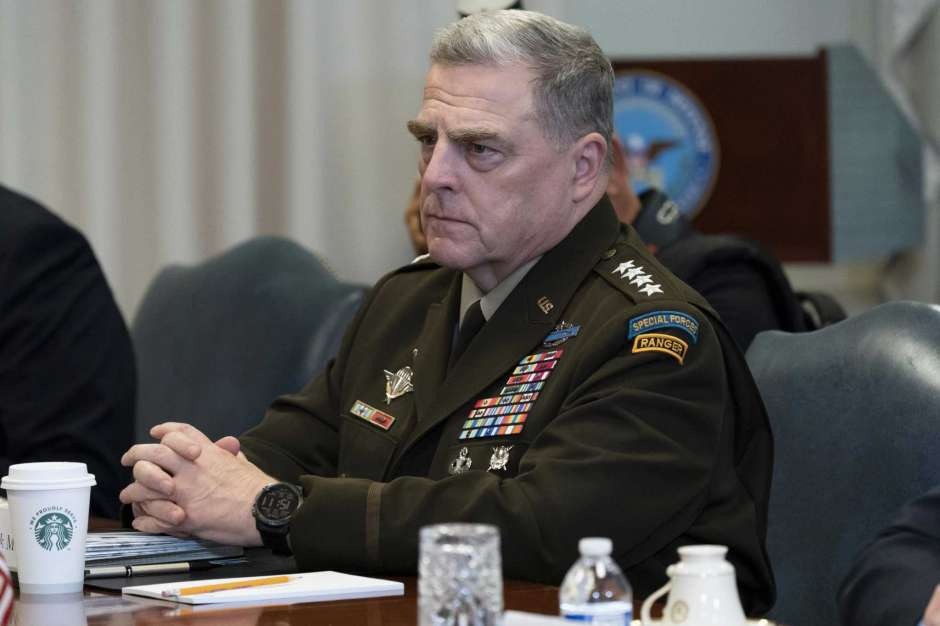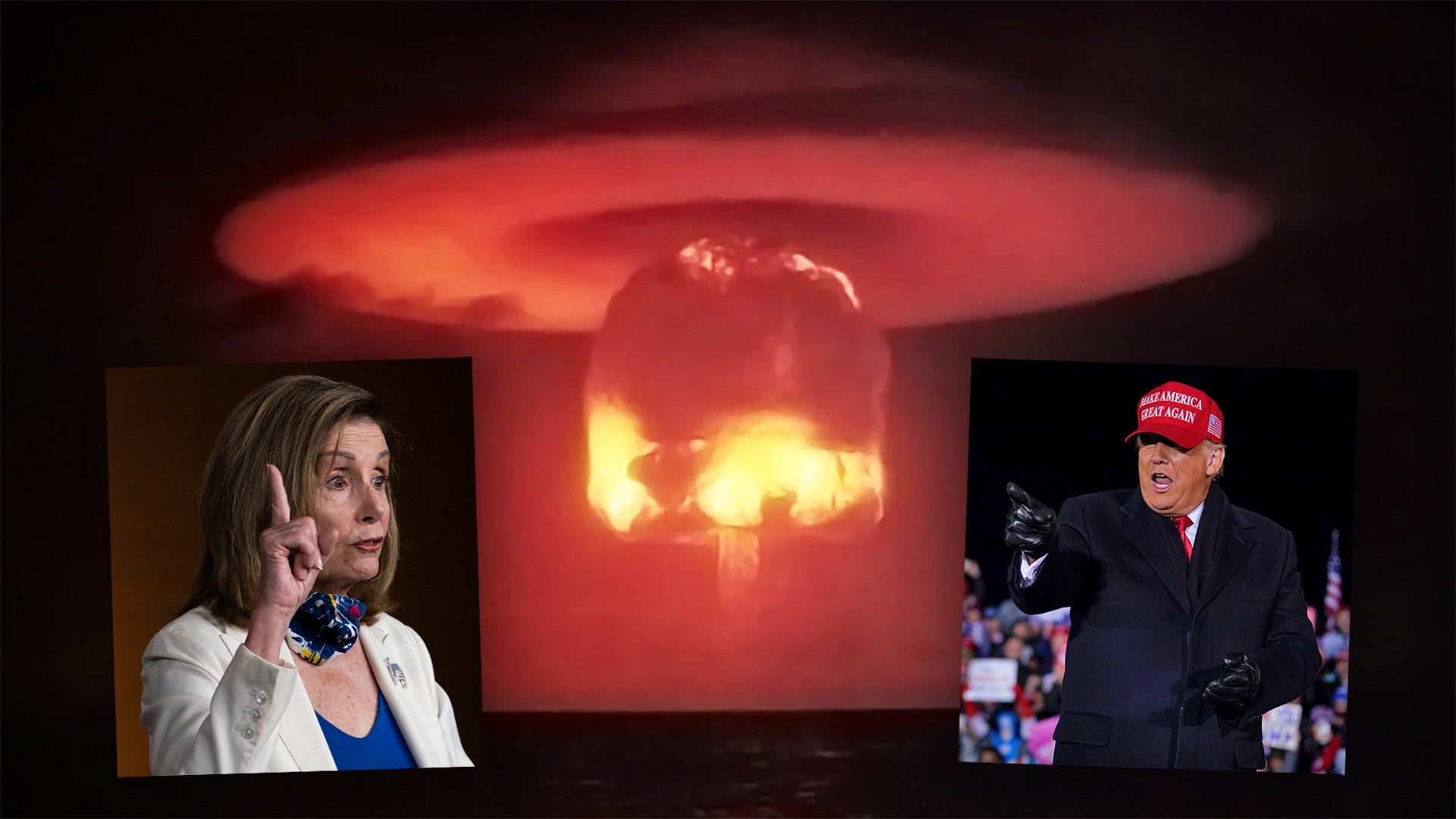Nancy Pelosi, the Speaker of the U.S. House of Representatives, has issued a statement that raises, in no uncertain terms, concerns about President Donald Trump’s continued authority to launch a nuclear strike in the last weeks of his term in office. This follows growing calls for Trump’s resignation, impeachment for a second time, or removal via the 25th Amendment following an unprecedented assault on the U.S. Capitol by a pro-Trump mob, which had been whipped up in part by the president’s own rhetoric, earlier this week. You can read more about those events, which took place as members of Congress met to certify President-elect Joe Biden’s victory in the 2020 election, in The War Zone‘s own recent reporting.
Speaker Pelosi, a California Democrat, made the comments about Trump’s access to the country’s nuclear codes in a statement to other members of her party in the House of Representatives on Jan. 8, 2020. That missive also included a call to keep protecting American democracy, a demand to remove Trump from office immediately, remarks about the death of a Capitol Police officer during the events earlier in the week, and information about resources for members who might now be coping with the trauma of the siege. Today, Pelosi is also set to meet with the House Democratic caucus with a view to launching new impeachment proceedings against the President before he leaves office on January 20.

“This morning, I spoke to the Chairman of the Joint Chiefs of Staff [U.S. Army General] Mark Milley to discuss available precautions for preventing an unstable president from initiating military hostilities or accessing the launch codes and ordering a nuclear strike,” Pelosi wrote regarding the nuclear strike issue. “The situation of this unhinged President could not be more dangerous, and we must do everything that we can to protect the American people from his unbalanced assault on our country and our democracy.”
General Milley’s office has confirmed the call. “Speaker Pelosi initiated a call with the Chairman. He answered her questions regarding the process of nuclear command authority,” a spokesperson told Military.com‘s Gina Harkins.
The Associated Press has also reported that a “top military official,” likely a reference to Milley, “assured her steps are in place to prevent Trump nuclear launch.” However, while Pelosi’s remarks underscore very significant concerns, there appear to be, at best, limited roadblocks to any President ordering a nuclear strike under the National Command Authority (NCA). The NCA is the current mechanism through which a nuclear strike would be initiated, something you can read more about here.
It is important to note immediately that the Joint Chiefs of Staff, including its Chairman, Milley, is primarily a military advisory body to the President, as well as the National Security Council, the Secretary of Defense, and the Secretary of Homeland Security. Milley and his colleagues are not even in the chain of command that would be used to carry out a nuclear strike.
“The President does not need the concurrence of either his military advisors or the U.S. Congress to order the launch of nuclear weapons,” a report the Congressional Research Service released in December on nuclear command and control says bluntly “In addition, neither the military nor Congress can overrule these orders.”
“Questions about the legality of the order—whether it is consistent with the requirements, under the laws of armed conflict (LOAC), for necessity, proportionality, and distinction—are more likely to lead to consultations and changes in the President’s order than to a refusal by the military to execute the order,” it continues. “In this sense, addressing legal questions about an order to use nuclear weapons would seem similar to the process used for evaluating any employment order from the President.”
At any given time, there is an officer just a few dozen feet away from the President carrying a secure communications device, known colloquially as the “nuclear football.” The Command-in-Chief can issue nuclear strike orders via this system after inputting the top-secret codes they carry at all times on a card known as the “biscuit.” There is a predetermined “menu” of strike options is available and the President can also immediately seek the advice of the military attaché with the football, who is fully briefed on the pre-planned options and their expected effects.

The matters of the proportionality of the response and adherence to the LOAC have long been understood to be the only real checks on a U.S. nuclear strike, something The War Zone
has explored in detail previously, including through the examination of declassified operations plans. The U.S. government notably does not have a “no first use” policy when it comes to its nuclear arsenal and reserves the right to employ these weapons in response to grave, but conventional threats. In addition, in the last year, the U.S. military has fielded new lower-yield warheads on its Trident D5 submarine-launched ballistic missiles loaded onto its Ohio class ballistic missile submarines, which have raised separate concerns about whether the threshold for ordering a nuclear strike has been lowered, a debate you can read more about in these past War Zone pieces.
This is more or less the reality that was outlined in a public Senate hearing on this very issue in 2017. Senators had discussed the authorities at play for more than two hours with retired U.S. Air Force General C. Robert Kehler, who had previously served as head of U.S. Strategic Command (STRATCOM), as well as former Acting Under Secretary of Defense for Policy Brian McKeon and Duke University Professor of Political Science and Public Policy Dr. Peter D. Feaver.
As The War Zone
Robust plans to maintain a so-called “continuity of government” in a crisis, something we at The War Zone have previously explored in depth, means that even if something happened to the president or other senior officials, this sole authority is always in the hands of a single individual. A mechanism known as the National Command Authority (NCA) does require the Secretary of Defense to confirm the order, but does not allow them to actively veto it. As such, the president can continue to fire and designate individuals to perform that function until someone approves the strike. The longer officials might attempt to dissuade the command in chief, the less time they would have to react to any incoming threats, though.
…
The established protocol essentially accepts the lack of any real check and balance beyond the president asking for and accepting the counsel of their closest advisers as necessary for the United States to offer a realistic threat of massive retaliation. At the same time, though, American military commanders are supposed to have the inherent right to refuse any orders they feel are unlawful. As already noted, the official U.S. military nuclear attack plan makes it clear that the strikes have to be in accordance with the Law of Armed Conflict, which requires any military action to be proportional to the hostile threat and to take all reasonable steps to avoid civilian casualties.
During the hearing, retired General Kehler said that had he received the order to launch a nuclear strike, but believed it to be lacking in legal justification, that he would have consulted his own advisers as to how to proceed. But since the United States is the only country to have ever used the weapons in anger and has only done so twice, there is no precedent whatsoever for how this might play out in an actual crisis.
“Then what happens?” Senator Ron Johnson, a Wisconsin Republican, asked Kehler to try to clarify the hypothetical chain of events and understand if the retired officer was truly implying he might have actually disobeyed the command.
“I don’t know,” Kehler said to nervous laughter from the assembled Senators.
The concerns that prompted that hearing are similar to the ones Pelosi has spoken to now in her statement. At that time, President Trump had made multiple threats to North Korea implying the potential use of nuclear weapons.
“Let me pull back the cover for a minute from this hearing,” Senator Chris Murphy, a Connecticut Democrat, had told the assembled panel. “We are concerned that the president of the United States is so unstable, is so volatile, has a decision-making process that is quixotic, that he might order a nuclear weapons strike that is wildly out of step with U.S. national security interests.”
The fear then, as now, is that Trump could order a nuclear strike that some might see as outside the realm of more expected scenarios, such as massive retaliation in response to an incoming nuclear attack on the United States, but is nevertheless determined to be technically legal. Any such situation could be made more complex depending on the exact nature of and timing of the order, which might very well be a reaction to a real crisis of some kind. There notably remain concerns about potential attacks on U.S. interests in the Middle East or elsewhere by Iran or its proxies that could prompt calls for a military response of some kind.
All told, it remains unclear what assurances Milley actually gave Pelosi during his recent call with her. It’s not clear, within the scope of the available authorities, what any part of the U.S. military may really be prepared to do or be capable of doing, outside of mass insubordination.
“I will follow any legal order that I’m given – I will not follow any illegal orders,” U.S. Navy Charles Richard, head of STRATCOM, told reporters the day before the siege on Capitol Hill, in response to question about potential nuclear strikes on Iran. “And if you go much further, if I were to say anything else, we’re starting to call in civilian control of the military, which I think is a prized American attribute.”
“Fundamentally, who has the authority to do that is a political question,” he continued. “If you ask me my best military advice, the system we have served us well, for 70 years. I don’t recommend any changes, but I’m prepared to execute whatever the political leadership of this nation would like to do.”
Still, simply slow-rolling the process might be one option to avert a potential nuclear strike. Then-President Richard Nixon was also presented with the option of a nuclear strike on North Korea in retaliation for that country shooting down an American spy plane over international waters in 1969. There is a distinct possibility that delays in presenting that and other possible courses of action to Nixon gave time for tempers to cool. No strike on North Korea, nuclear or conventional, was ultimately carried out and Nixon received praise for his restraint.
Just how real the risk is of Trump ordering a nuclear strike under suspect circumstances is unclear, as well. Though Trump is certainly a very different individual from Nixon, he has already received accolades in the past for a similar decision not to strike Iran after that country’s Islamic Revolutionary Guard Corps (IRGC) shot down a U.S. Navy RQ-4 Broad Area Maritime Surveillance Demonstrator (BAMS-D) drone flying in international airspace in 2019.
“The nuclear launch codes are literally in Donald Trump’s pocket, and as President he has the full legal authority to order a nuclear strike at any time. Every minute Trump maintains his authority as commander-in-chief is another moment of peril for the United States and the world,” Bruce Blair, a former U.S. Air Force missile launcher officer and a co-founder of Global Zero, which advocates for the complete elimination of nuclear weapons around the world, said after Pelosi’s statement became public. “Ordering a nuclear strike may seem far-fetched, but until yesterday many would have said the same about a U.S. President inciting a mob to attack and terrorize the halls of government.”
With Democrats now poised to take control of the office of the President, as well as both chambers of Congress, this month, we may well see new movement to find ways to curtail the Command-in-Chief’s nuclear authority, while still preserving America’s nuclear deterrent posture, later this year.
Contact the author: joe@thedrive.com
